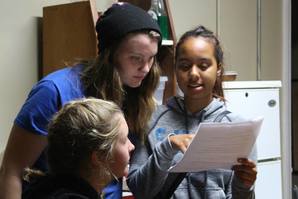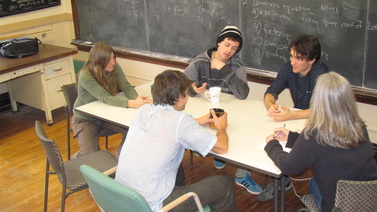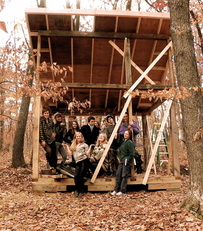More than just a number...

Student to teacher ratio; it's what every superintendent, principal, and politician is talking about. The lower the ratio the more likely that the education will be one of quality. Last year we had 41 students and 35 teachers - that's 1.17 students to every teacher. When we say one-on-one support, we really mean it.
A prerequisite of our goal to educate the whole human being is to truly understand the student as a human being - to know a student's potential and challenges, fears and dreams. At Youth Initiative High School our relationships are human relationships.
Students quickly become part of an extended family and their teachers come to know them on a personal basis. It is within this relationship, one of mentorship, trust, and respect, that learning can truly begin. At Youth Initiative High School we have built unique and successful strategies to ensure each student has the opportunity to reach his or her full potential.
A prerequisite of our goal to educate the whole human being is to truly understand the student as a human being - to know a student's potential and challenges, fears and dreams. At Youth Initiative High School our relationships are human relationships.
Students quickly become part of an extended family and their teachers come to know them on a personal basis. It is within this relationship, one of mentorship, trust, and respect, that learning can truly begin. At Youth Initiative High School we have built unique and successful strategies to ensure each student has the opportunity to reach his or her full potential.
Personalized Academic Counseling

Youth Initiative High School’s academic counseling program begins before a student’s first day of high school and lasts until that student’s first day of college. Our academic counseling program isn’t just a series of meetings to make sure a student is on track; it is integrated into the very fabric of education at Youth Initiative High School.
Beginning in grade 9 students learn about the unique governance and fund-raising structure of the school and hone basic academic skills such as essay writing, note-taking, time management, etc. Teachers and House Leaders pay close attention to the concerns and questions that come naturally from being a new student in a very busy school.
In the 11th and 12th grade students work with faculty on an individual basis to make sense of the college application process. Time is set aside to focus on the application essay, financial aid and scholarship applications, and selecting a school that is right for the student.
Academic counseling at YIHS not only aims to land students at the college of their choice but to ensure that students have the academic and social maturity to succeed beyond high school.
Beginning in grade 9 students learn about the unique governance and fund-raising structure of the school and hone basic academic skills such as essay writing, note-taking, time management, etc. Teachers and House Leaders pay close attention to the concerns and questions that come naturally from being a new student in a very busy school.
In the 11th and 12th grade students work with faculty on an individual basis to make sense of the college application process. Time is set aside to focus on the application essay, financial aid and scholarship applications, and selecting a school that is right for the student.
Academic counseling at YIHS not only aims to land students at the college of their choice but to ensure that students have the academic and social maturity to succeed beyond high school.
Copyright © 2023 Youth Initiative High School | 500 E. Jefferson St, Viroqua WI 54665 | (608) 637-6445


